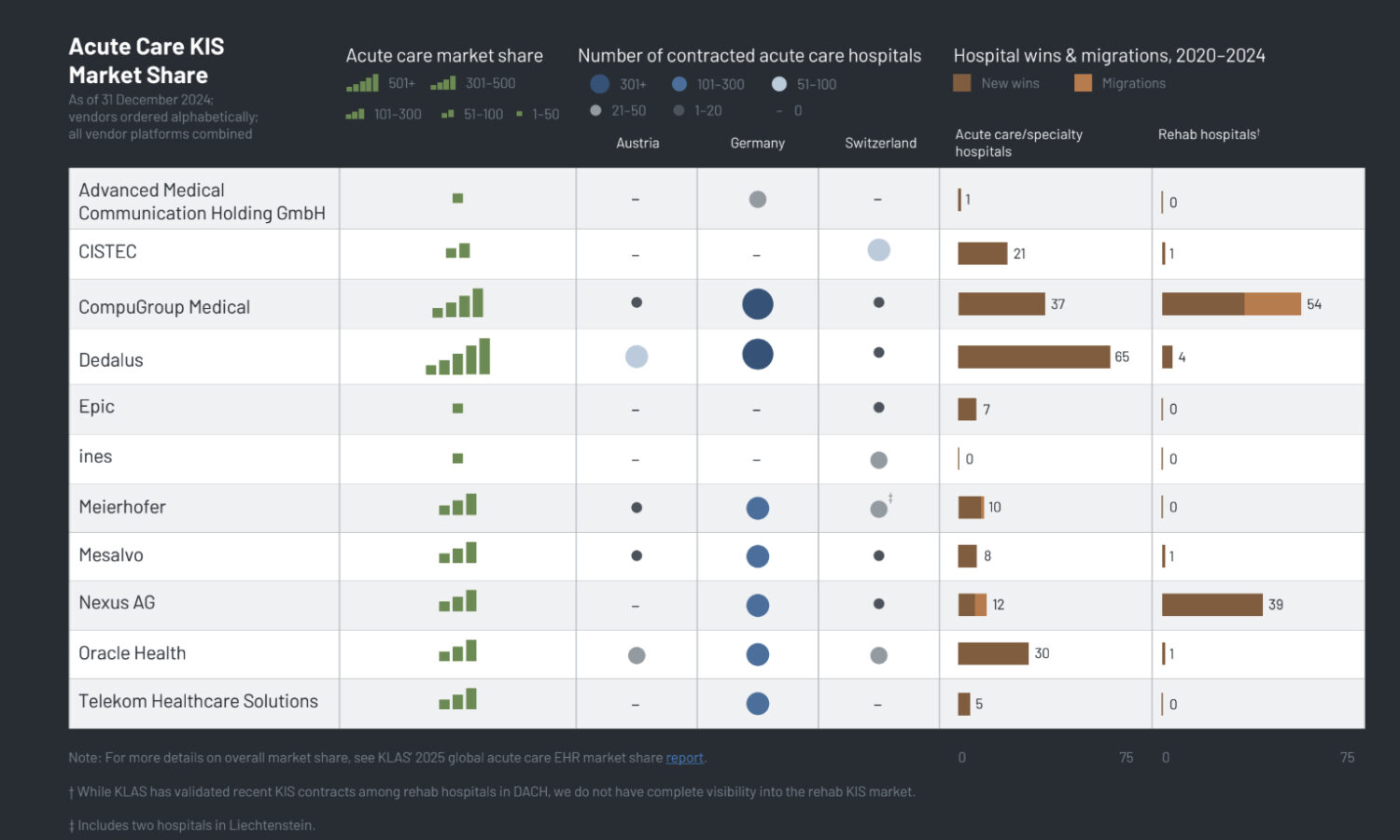
What You Should Know:
– According to a new KLAS report, the KIS (EHR) market in the DACH region is seeing significant energy as healthcare organizations in Germany, Austria, and Switzerland are making major system decisions driven by regulatory investments and a growing pressure to modernize, resulting in hospital mergers and acquisitions.
– The new KLAS Research report, “DACH KIS 2025,” offers an in-depth analysis of the hospital information system (KIS), or EHR, market across Germany, Austria, and Switzerland. The report reveals generally high overall satisfaction among providers in the region, while also providing critical insights into key vendor performance, the transformative impact of Germany’s Krankenhauszukunftsgesetz (KHZG) act, and the evolving digital needs of healthcare organizations.
DACH Vendor Satisfaction and Market Leadership
The DACH region refers to the three Central European countries of Germany (D), Austria (A), and Switzerland (CH). The DACH KIS 2025 report is based on interviews with 46 healthcare organizations in the DACH region, providing a comprehensive look at market dynamics and user experiences with their EHR solutions. The study details customer satisfaction scores across various vendors and identifies key drivers of both positive and negative experiences.
The report highlights that DACH healthcare organizations are highly satisfied with their EHR partners, with an average overall satisfaction score of 8.0 out of 9.0.
- Dedalus: As the 2024 and 2025 Best in KLAS winner for Acute Care EHR in DACH, Dedalus continues to expand its market share. Customers praise its comprehensive and integrated solution, noting its responsiveness and broad functionality. However, some clients express a desire for more innovation and flexibility within the platform.
- Nexus AG: This vendor receives high marks for its user-friendly interface and strong support, particularly benefiting small and mid-sized hospitals. Customers appreciate Nexus AG’s deep understanding of local market needs and its collaborative approach to product development.
- Oracle Health: Customers generally report satisfaction with the stability and comprehensive nature of their Millennium PowerChart and i.s.h.med systems, often highlighting their ability to handle complex hospital workflows. However, some clients mention concerns about the cost and implementation timelines, as well as a perceived lack of flexibility in the platform. Notably, the report states that Oracle Health’s i.s.h.med, commonly used by large organizations, is being sunsetted, creating new market opportunities.
- CompuGroup Medical (CGM): The report also includes insights on CGM, detailing their customer satisfaction and key strengths in the market.
The Impact of KHZG on German Healthcare
Germany’s Krankenhauszukunftsgesetz (KHZG) act is a significant driver of change in the DACH region. The report explores how this act is influencing purchasing decisions, with many hospitals focusing on modernizing their IT infrastructure and adopting digital solutions to meet KHZG funding requirements. The act is seen as a catalyst for digital transformation, pushing organizations to invest in areas like patient portals, digital documentation, and advanced interoperability. This regulatory push is occurring against a backdrop of historically low IT investment in Germany and lower overall EHR satisfaction in DACH compared to other global regions.
Evolving Needs and the Path Forward
The DACH KIS 2025 report identifies several evolving needs that are shaping the future of EHRs in the region:
- Digital Transformation: Healthcare organizations are prioritizing digital transformation projects, with a focus on improving patient and clinician experiences.
- Interoperability: There is a growing demand for EHRs that can seamlessly integrate with other systems and devices to create a more connected healthcare ecosystem.
- AI and Analytics: Customers are increasingly looking for solutions that incorporate AI and advanced analytics to improve clinical decision-making and operational efficiency.
- Clinician-Friendly Workflows: Ease of use and intuitive workflows are top priorities for clinicians, as they seek to reduce administrative burdens and focus more on patient care.
For more information about the KLAS report, visit https://klasresearch.com/report/dach-kis-2025-shifting-market-dynamics-drive-hospitals-to-evaluate-options/3470
